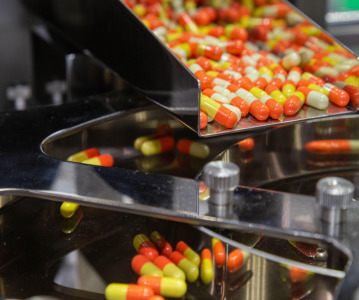AZ and Oxford COVID-19 vaccine brings end of pandemic a little closer
.png)
AstraZeneca's production and manufacturing facility. (Source: AstraZeneca)
AZD1222 is 90% effective, cheap to produce and easy to store, distribute and administer
After the last two weeks of positive trial results for COVID-19 vaccine candidates from Pfizer/BioNTech and Moderna, Monday proved to be the turn of the University of Oxford and AstraZeneca.
Positive high-level results from early Phase III clinical trials of AZD1222 in 24,000 volunteers in the UK and Brazil indicate the candidate vaccine was highly effective in preventing COVID-19.
Encouragingly, no hospitalisations or severe cases of the disease were reported in participants receiving the vaccine.
One dosing regimen showed vaccine efficacy of 90% when AZD1222 was given as a half dose, followed by a full dose at least one month apart. Another dosing regimen showed 62% efficacy when given as two full doses at least one month apart. The combined analysis from both dosing regimens resulted in an efficacy of 70.4%.
Data also suggest that this half dose and full dose regime could help to prevent transmission of the virus, evidenced by lower rates of asymptomatic infection in the vaccinees, with further information to become available when trial data are next evaluated.
An independent Data Safety Monitoring Board determined that the analysis met its primary endpoint showing protection from COVID-19 occurring 14 days or more after receiving two doses of the vaccine.
Setting this COVID-19 vaccine apart from the Pfizer/BioNTech and Moderna candidates is that it can be easily administered in existing healthcare systems, stored at fridge temperature (2–8 °C) for at least 6 months and distributed using existing logistics.
The vaccine, which was co-invented by the University of Oxford and its spin-out company Vaccitech, uses a replication-deficient chimpanzee viral vector based on a weakened version of a common cold virus (adenovirus) that causes infections in chimpanzees and contains the genetic material of the SARS-CoV-2 virus spike protein. After vaccination, the surface spike protein is produced, priming the immune system to attack the SARS-CoV-2 virus if it later infects the body.
Professor Andrew Pollard, Director of the Oxford Vaccine Group and Chief Investigator of the Oxford Vaccine Trial, said: "These findings show that we have an effective vaccine that will save many lives. Excitingly, we’ve found that one of our dosing regimens may be around 90% effective and if this dosing regime is used, more people could be vaccinated with planned vaccine supply."
AstraZeneca is making rapid progress in manufacturing with a capacity of up to 3 billion doses of the vaccine in 2021 on a rolling basis, pending regulatory approval.
Related News
-
News Pharmapack Awards 2024 Patient-Centric Design Award Winner – Dr Ferrer BioPharma
The 2024 Pharmapack Awards celebrated the best in innovation and design for the pharmaceutical packaging and drug delivery industry on January 24, 2024. -
News Women in Pharma: Minding the Gap at Pharmapack 2024
2024 marks the first year Pharmapack will host a Diversity track dedicated to bridging the gap within the pharmaceutical packaging and drug delivery sector. The track includes a panel discussion on 'Enabling Diversity in the Workplace,' focused... -
News Pharmapack Awards 2024 - Celebrating Packaging and Drug Delivery Innovation
The 2024 Pharmapack Innovation Awards ceremony celebrated the best in pharmaceutical packaging and drug delivery innovation at all levels. The awards were held on January 24, 2024 at the Paris Expo Porte de Versailles. -
News 2024 Pharma Industry Trends Outlook: Collaboration, Market Maturity, and Digital Futures
The annual CPHI Online 2024 Pharma Trends Outlook, in partnership with Arvato Systems, identifies 12 key industry trends shaping the life sciences industry in the coming year. -
News New Novo Nordisk AI hub for drug discovery to open in London, UK
Danish pharmaceutical giant Novo Nordisk will be opening an AI-based research facility in the heart of London to advance drug discovery operations. -
News BioNTech to begin mRNA vaccine manufacturing in Rwanda by 2025
German biotechnology company BioNTech has stated their intentions to begin production at their mRNA vaccine factory in Rwanda by 2025, which will mark the first foreign mRNA vaccine manufacturing site on the continent of Africa. -
News Women in Pharma: Looking back on 2023 and moving forward to 2024
In this monthly series, we interview women from across the pharmaceutical industry and supply chain to discuss the importance of gender diversity in healthcare, the workplace, and beyond. -
News CPHI Barcelona 2023: Partnering for Success – Managing Outsourcing Relationships to Optimise Manufacturing Operations
During CPHI Barcelona 2023, insightful content sessions offered attendees the chance to explore trending topics with expert speakers and panellists. Here, we summarise what the pharma industry and supply chain are talking about the most.
Position your company at the heart of the global Pharma industry with a CPHI Online membership
-
Your products and solutions visible to thousands of visitors within the largest Pharma marketplace
-
Generate high-quality, engaged leads for your business, all year round
-
Promote your business as the industry’s thought-leader by hosting your reports, brochures and videos within your profile
-
Your company’s profile boosted at all participating CPHI events
-
An easy-to-use platform with a detailed dashboard showing your leads and performance







